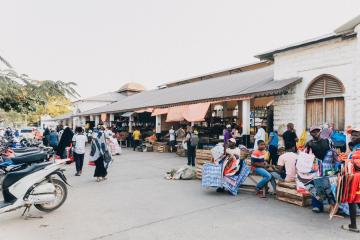Zanzibar – COVID damaged economies and the tourism sector everywhere. As cities are the global focus of economic activity, population growth and health risk, how do we better prepare both old and new cities for health emergencies? In Africa alone, more than half the population is expected to live in cities in just 15 years. WHO convenes the first global health and urbanization meeting of city and health officials, to share COVID and other lessons learned, to see how to better prepare – for future pandemics and health emergencies.
“As we saw from COVID, preparing and responding to health emergencies goes well beyond the ministry of health, so to border control, trade, water and sanitation. As millions are at risk in urban areas and beyond, cities and countries need to work across sectors, to plan better to respond to emergencies.” Said Dr. DICK CHAMLA, Emergencies Preparedness Manager, WHO-AFRO.
People move to cities for all kinds of reasons, mostly for work, to flee conflicts and climate change, and to try to live a better life. Urbanization is one of the leading global trends of the 21st century, with a significant impact on health. Today, over 55% of the world’s population live in urban areas – expected to increase to 68% by 2050. Most of the 4.2 billion people living in cities suffer inadequate housing and transport, poor sanitation and waste management, and air quality that fails WHO guidelines. Urbanization is increasing, and 60 % of the urban space that we will need globally in 2060 is yet to be built.
“As most future urban growth will take place in developing countries, this is a unique opportunity to rethink and better plan urban space to keep us all safer in emergencies and beyond – with good water and drainage, primary health care and open space.” Said Graham Alabaster, Director of Geneva Office, UNHABITAT.
Africa is currently dealing with 85 outbreaks and 35 humanitarian crises. Moving forward, old and new cities need to be built to handle health emergencies and to save lives, with accessible and robust infrastructure, such as hospitals, clinics, laboratories, and emergency systems and of course access to clean water and sanitation. This also means investing in health security infrastructure and training healthcare workers and responders.
“Urban development and urban preparedness must work together across sectors to better prepare and respond to health emergencies: from floods to pandemics, from shelters to border controls, from human to animal health in traditional markets, to keep everyone safe from health emergencies.” said Ludy Suryantoro, Head of Multisectoral Engagement for Health Security Unit Health Security Preparedness, WHO.
The Technical Consultation on Advancing Health Emergency Preparedness in Cities and Urban Settings, in Zanzibar, 13-14 June, is the first global meeting WHO is convening on Urbanization and health, with representatives from cities and countries sharing experiences, just after the WHO DG reported back to the annual World Health Assembly, end of May, on progress on the first ever Resolution on Health and Urbanization.
For information please contact: Mawuena ADJEIDU adjeidum [at] who.int +233 26 889 1133. Samantha BOLTON sbolton [at] WHO.int +41 79 239 2366 @sambolton007
>>> Read full article>>>
Copyright for syndicated content belongs to the linked Source : WHO Africa – https://www.afro.who.int/countries/united-republic-of-tanzania/news/global-city-authorities-and-partners-meet-zanzibar-1st-ever-discussion-advancing-urban-preparedness
